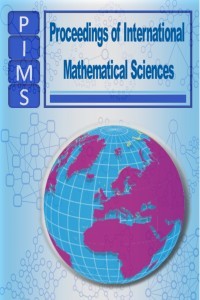Diophantine Attack on Prime Power With Modulus $N=p^rq$
Diophantine Attack on Prime Power With Modulus $N=p^rq$
Diophantine; Attack;, Prime power;, Moduli;, Continued fraction;,
___
- 1. M. K. Dubey, N. Ratan, R. Verma, N. Saxena, Cryptanalytic attacks and countermeasures on RSA, in: P. K. (2014): In Proceedings of the Third International Conference on Soft Computing for Problem Solving, Springer, 2014, 10--18.
- 2. T. Fujioka, A. Okamoto, S. Miyaguchi, ESIGN: An efficient digital signature implementation for smart cards, in: Advances in Cryptology EUROCRYPT 91, Lecture Notes in Computer Science, Springer, 1991, 446--457.
- 3. T. Okamoto, S. Uchiyama, A new public-key cryptosystem as secure as factoring, in: Advances in Cryptology EUROCRYPT’98, Lecture Notes in Computer Science, Springer, 1998, 308--318.
- 4. T. Takagi, Fast RSA-type cryptosystem modulo $p^kq$, in: Advances in Cryptology CRYPTO ’98. CRYPTO 1998. Lecture Notes in Computer Science, Springer, 1998, 318--326.
- 5. A. May, Secret exponent attacks on RSA-type schemes with moduli $N = p^rq$, in: Public Key Cryptography-PKC 2004, Springer, 2004, 218--230.
- 6. S. Sarkar, Small secret exponent attack on RSA variant with modulus $N =p^2q$, in: Proceedings International Workshop on Coding and Cryptography-WCC 2013, Norway and INRIA, 2013, 215--222.
- 7. R. Lu, Y. Zhang, D. Lin, New results on solving linear equations modulo unknown divisors and its applications, IACR Cryptology eprint \textbf{1} (1-4) (2014) 343--354.
- 8. S. Sarkar, Revisiting prime power RSA, Discrete Applied Mathematics \textbf{203}(C) (2016) 127--133.
- 9. K. Itoh, K. Kunihiro, K. Kurosawa, Small secret key attack on a variant of RSA (due to takagi), in: CT-RSA 2008, in:LNCS, 2008, 387--406.
- 10. J. Bl¨omer, A. May, A generalized Wiener attack on RSA, in: International Workshop on Public Key Cryptography, Springer, 2004, 1--13.
- 11. J. Hinek, On the security of some variants of RSA, Phd thesis, Universiti Waterloo, Ontario, Canada (2007).
- 12. A. Nitaj, M. Ariffin, D. Nassr, H. Bahig, New Attacks on the RSA cryptosystem, in: Progress in Cryptology AFRICACRYPT 2014. Lecture Notes in Computer Science, \textbf{8469}, Springer, 2014, 178--198.
- 13. S. Shehu, M. Ariffin, New attacks on prime power RSA $N = p^rq$ using good approximation of $\phi(N)$, Malaysian Journal of Mathematical Sciences special issues:The 5th International Cryptology and Information Security Conference(New Ideas in ) \textbf{11}(S) (2017) 121--138.
- 14. H. Lenstra, A.K. Lenstra, L. Lovsz, Factoring polynomials with rational coefficients, Mathematische Annalen (1982) 513--534.
- 15. Nitaj, Diophantine and lattice cryptanalysis of the RSA cryptosystem, in: Artificial Intelligence, Evolutionary Computing and Metaheuristics, Springer, 2013, 139--168.
- 16. X. Wang, X. G., M. Wang, X. Meng, Mathematical Foundations of Public Key Cryptography, CRC Press, Boca Rating London New York, 2016.
- ISSN: 2717-6355
- Yayın Aralığı: Yılda 2 Sayı
- Başlangıç: 2019
- Yayıncı: İbrahim ÇANAK
A Note On The Stability of Solution for Elliptic-Schrödinger Type Nonlocal Boundary Value Problem
Diophantine Attack on Prime Power With Modulus $N=p^rq$
Saıdu ISAH ABUBAKAR, Ibrahim ZAİD, Sadiq SHEHU, Rufa'ı AHMAD
On The Stability of Nonlocal Boundary Value Problem for Schrödinger-Parabolic Equations
Characterization of Absolutely Norm Attaining Compact Hyponormal Operators
